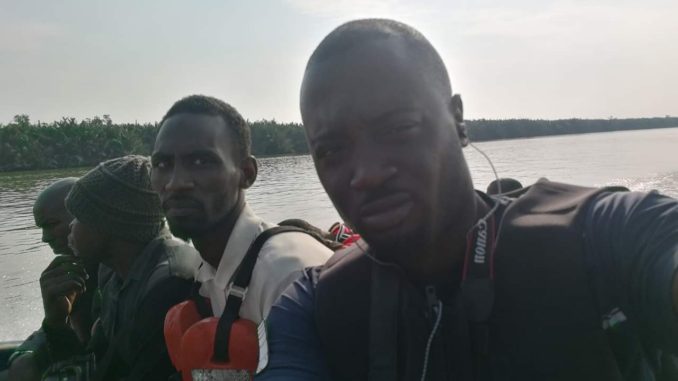
Calabar was fun. Leaving Josh’s residence, I headed straight to Watt Market from where I would take a walk to the waterfront. I was headed to Douala but I would first have to take a ferry to Oron. So, my itinerary was thus: Calabar to Oron; Oron; Limbe and then finally to Douala. My mission to Cameroon was a simple one. First, to experience travelling in the ocean for the first time and secondly, to climb the highest peak in Central and Western Africa, The Cameroon mountain which is situated in Buea.
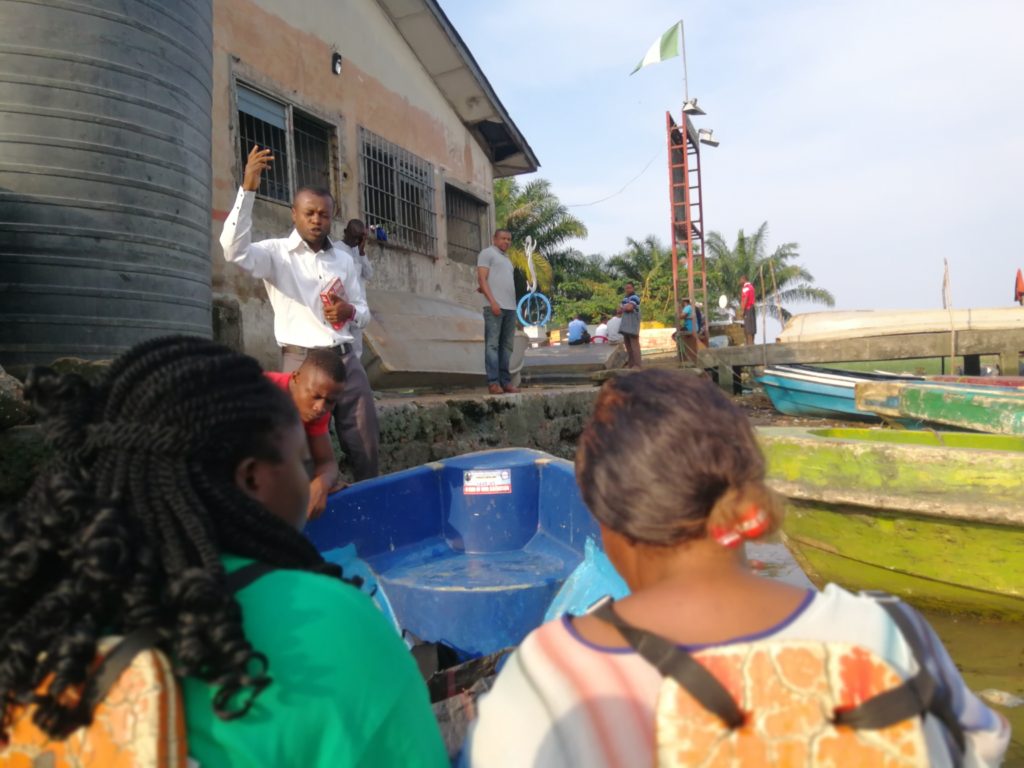
The journey from Calabar to Oron, a 30-minute ride on a speed boat costs 1500 Naira ($5). There were two passengers on the queue with me to buy tickets who spoke French and I knew these were from Cameroon. While waiting to board the boat for the journey, I decided to go have a word with them and see if there is any way they could be of help during the trip.
These two ladies are business women. They buy goods from Nigeria and go back home to sell in Cameroon. The elderly one I decided to call Madam while the younger one is Anna-Marie. Somehow, all of us made it to Limbe together before we eventually went our separate ways. We patiently waited for another 15 minutes or so for the other passengers to board before we set out on the journey to Oron. The trip was all fun. An attempt to take pictures of the port before we left was met by a reprimand by one of the persons there who was neither a customs officer nor an immigration official. I know very well that in most countries – especially international sea ports or airports, one is not allowed to take photographs of their structures and surroundings. I did not bother to respond to the man since I was already in the boat and there was nothing he could do to stop me.
“Oga, come join us, na only three people e remain!” These were the words that some of the touts (referred to as agbero in some parts of Nigeria) who looked out for customers on the boats welcomed us with. They were looking for passengers to travel with any boat after which they are given a commission of what we pay. Boats coming from Calabar were known to most times convey passengers going to Cameroon or merchants who come to do business in Oron. Two of my friends who I met earlier and myself were the only ones going to Cameroon. I also met a Senegalese in the boat who claimed her’s was Douala bound but did not have enough money. In as much as I entertained thoughts of helping him, I also discovered that his entrance to Nigeria was not properly documented on his passport, even though he had a valid and a new one, I know he will eventually have problems when he arrives in Cameroon. For this singular reason, I could not do anything. I however excited him by speaking a few things I knew in Wolof. Communication with him was only in French till the point I spoke some Wolof to him. I could see how excited he was at my understanding of Senegal and his languages (French and Wolof). Leaving him at that point to continue the journey was a bit emotional despite the fact we just met but, I had to continue.
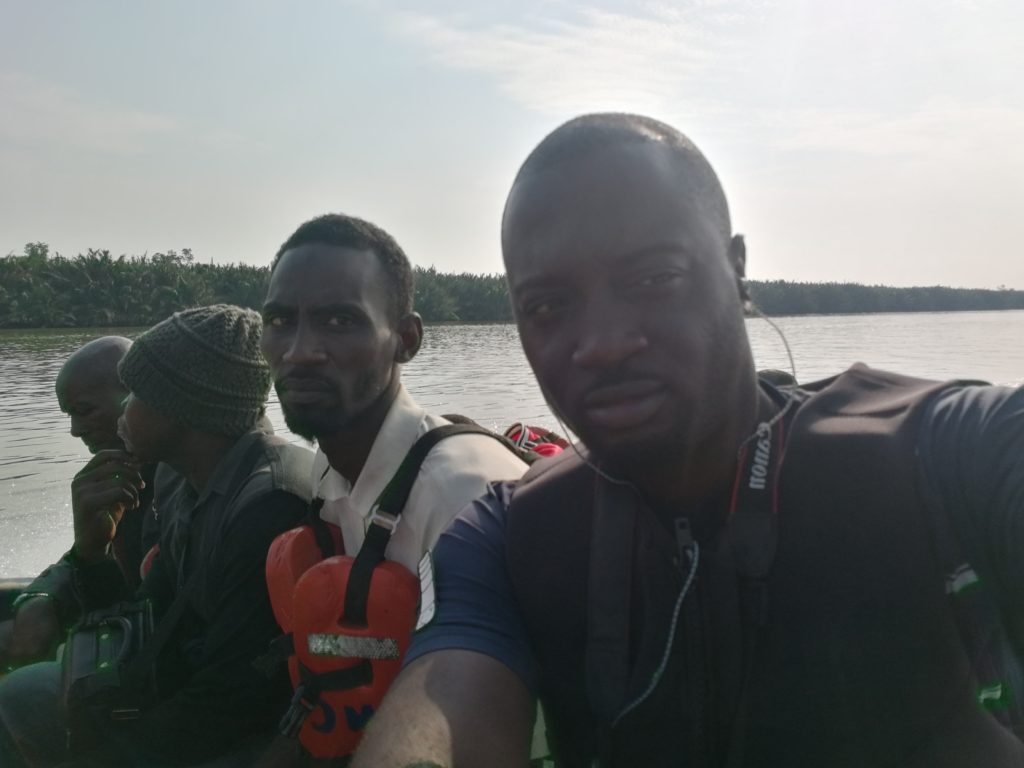
My two friends and I followed these touts to the boat, booked a place without payments and walked some 2 minutes down to the immigration post to document our exit. The head of the immigration unit allowed me to exit without problems when he learnt I am journalist – he did not ask me for money or unnecessary questions. I however had some issues with the gentleman at the Port Health Authority who initially complained my Vaccination Card (aka Yellow in Nigeria) was not always stamped and he told me I had to pay to have it stamped. That was the point an argument ensued. When I succeeded in convincing him that I am not supposed to stamp on it each time like I do on my passport, he complained of not having an entry for polio vaccination on the card. This was also a very big blunder as polio vaccination especially in Africa is given mostly at child birth. I also corrected him and at this point, the immigration officer who cleared me earlier came and signaled the gentleman to let me go. One of the things I observed there in Cameroon eventually was that they always wanted to see several stamps on the vaccination card and if you can get vaccinated for polio as well, it may reduce your stress whenever one is accosted by the police in Cameroon who always ask for the vaccination card once they see a foreigner.
We set out for Cameroon and such a journey it was. This should be my first time of journeying in the ocean. The ocean was initially calm but at some point in the journey, it was troubled. The boat I traveled on had a captain and a boat boy who sat with me most of the time during the journey to explain several things to me, I also asked him lots of questions about Cameroon, life in the ocean and as a boat boy and several other things. I was not allowed by the captain to take pictures during most part of the journey as they claimed there were several naval police posts we were likely to pass. It was during the journey I also learnt that in the boat, if you wish not feel the impact of the tides in the ocean, it is advisable to seat towards the back of the boat. We passed several naval police posts in the ocean during the journey. We stopped at the sighting of each of them and the captain instructed us to raise out hands till we got to where they are…the reason for raising our hands is to prove to them we are not militants and that we do not have any weapons to attack them. The other reason we got so close to them was to give them bribe. Militancy has been on the increase in the Niger Delta recently. I was also bordered about the ethnicity of most of these naval police officers – but I may not want to discuss that for now.
We sailed like one hour to arrive Bakassi Peninsula, the strongly contested region between Nigeria and Cameroon. We continued until we eventually left the Nigeria waterways. I also noticed people travelling on the sea are very friendly – we waved at other boats who were making it our way or on the opposite direction. Our engine stopped two times but thanks to the ingenuity of our captain who resolved the problem each time and put us back on the trip. We made an emergency stop at a little village where the captain requested that myself and my two friends should disembark while he goes on a trip with other passengers. He promised to come back for us. Even though this was risky, we had no option but to oblige.
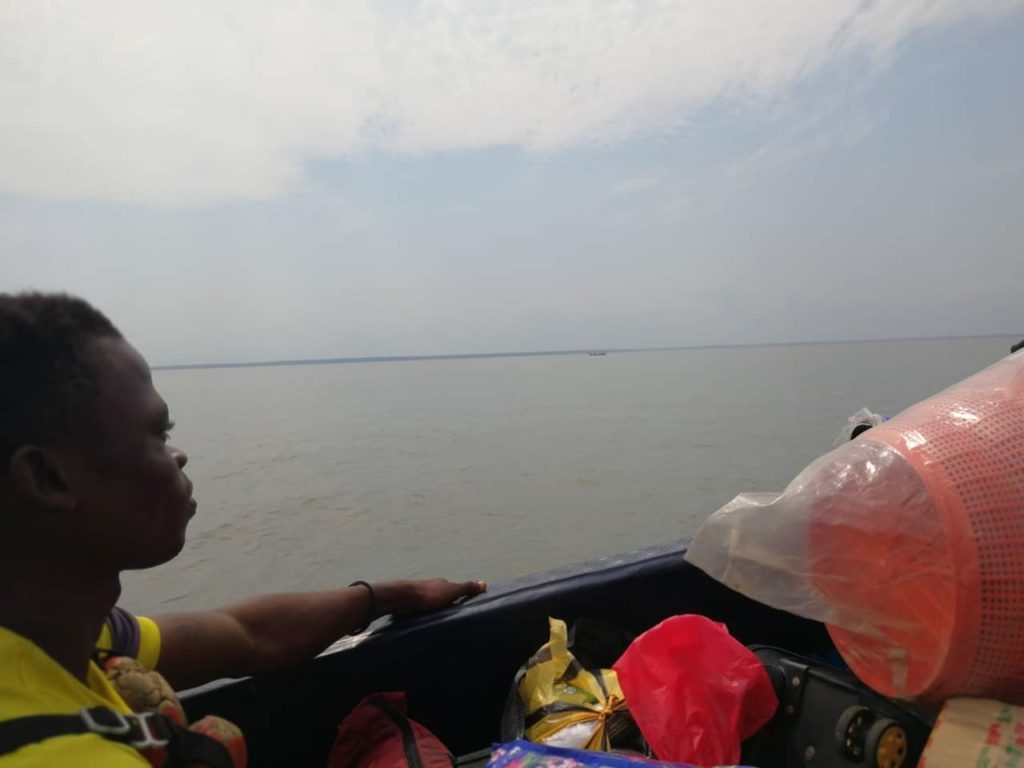
Uben-Ekang is a sandy coast land, with a long creek that clears into the Atlantic Ocean, with the interior portion of the creek leading into the rear of the fishing port without penetrating the mainland. This therefore, leaves a good section of the land of Uben-Ekang surrounded by water. The sandy beach section of the land faces the Atlantic Ocean and is considered to be its front. The far northeastern part of the Uben-Ekang coasts leads to the Cameroonian port cities of Limbe, Tiko and Douala. On clear bright weather days, it was possible to stand on the Cameroonian coastland of Uben-Ekang and view the landscape of Spanish Island of Equitorial Guinea on the horizon across the Atlantic Ocean. We disembarked and he left us there for almost an hour waiting. I used the opportunity to take some good shots and as well ask a few questions about the place, the language, tribes, cultures etc it dawned on me that these people have the same culture and language as the Oron people of Nigeria. They bear similar names and lots more. For this, it got me thinking on how the Europeans literally divided Africa on paper without considering several similarities in our cultural identities. The ladies with me also used the opportunity to go shopping in the village. They bought lots of fishes and other things.
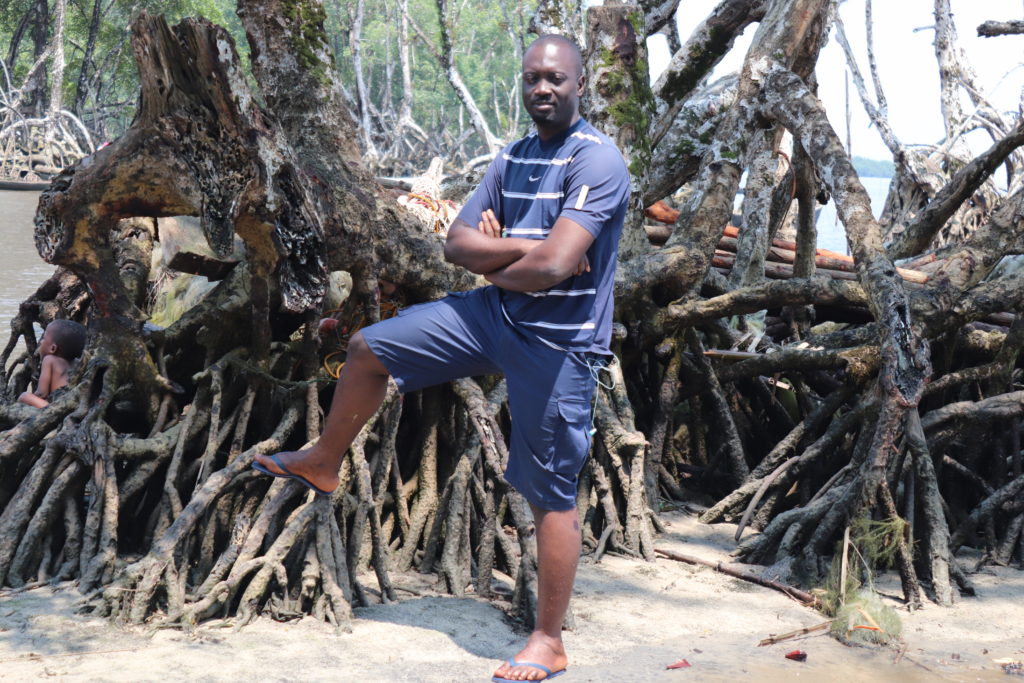
The Captain of the boat came back to where we were and we went to another location to get a new manifest that will eventually get us to Cameroon. This step was very important because in as much as several passengers boarded the boat, not all were headed to Cameroon and on arrival, immigration and the police in Cameroon will crosscheck to ensure that the number of people in the manifest corresponds to the number they are seeing in the boat. We had a manifest from Nigeria and several people left at different points and on different islands.
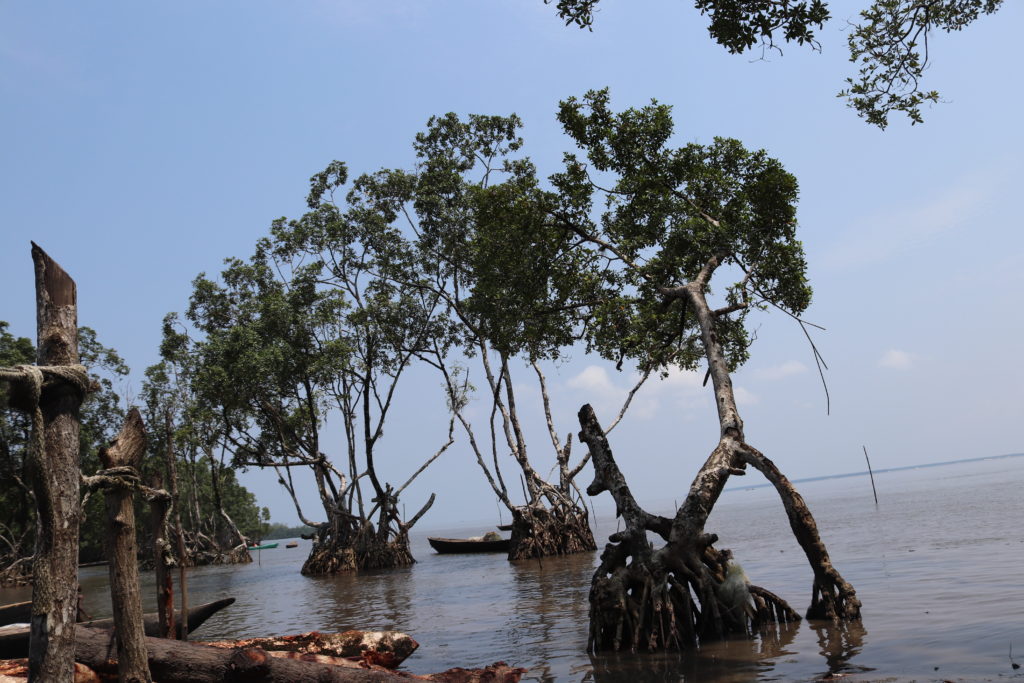
The last but a very important part of the trip was a point we had to cross a point near Idenau port where was very notorious for having a very high ocean current and many boats have capsized and killed many at that point. We came there and my two friends started prayers and all sorts of spiritual activities. For that 15 seconds or so we struggled with the tides, it was funny but serious. We passed it and then proceeded to Immigration and to a Bureau de Change where I could change some local money for use.
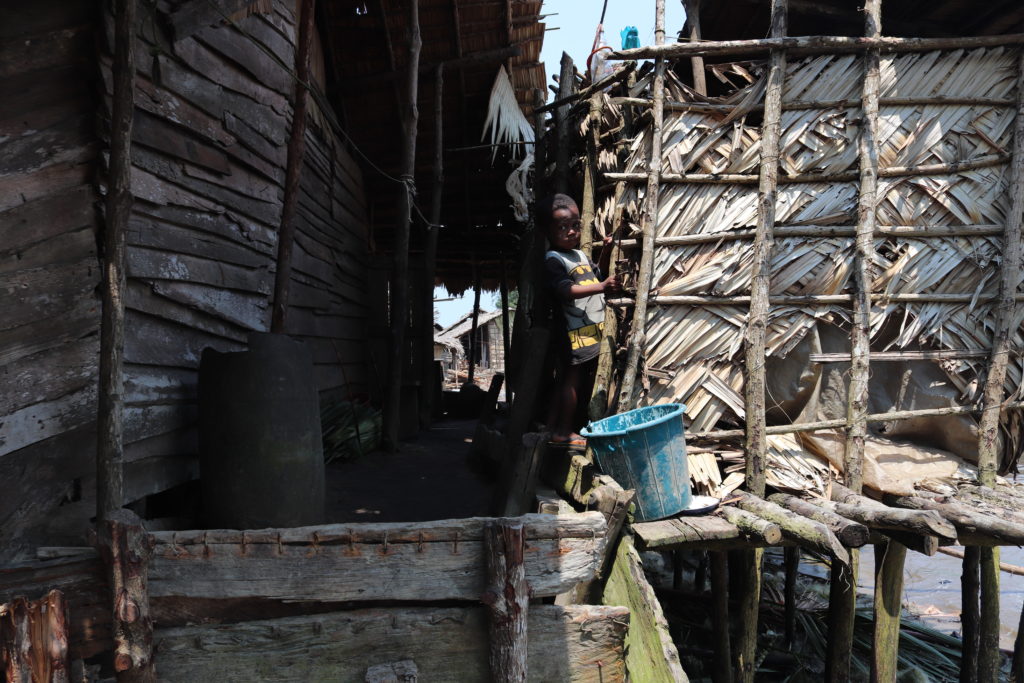
My experience at the Idenau immigration went thus: on arrival, our passports and identity cards were collected by an immigration officer who now directed us to pick it up at another office. On getting to this new office, I was told to pay a whooping sum of ten thousand cfa (10000 CFA) which is around $20. After a lot of bargaining for almost 15 minutes, I was allowed to pay half the price after which I was allowed to leave.
We also heard an unfortunate news of a boat that was meant to be shipping around 500 bags of rice that capsized that same day. My friends confirmed that our boat passed that same boat at some point in our journey but it was not fortunate enough to make it to the sea port in Cameroon. One of the ladies we met blamed it on the transporters who most times, overload the ship with goods that belongs to other merchants. In this case for instance, the boat was meant to take only 500 bags of rice but they succeeded in smuggling in another 200 bags for other customers. The over-weighted boat coupled with the turbulent sea resulted in the shipwreck!
We continued from Idenau to Limbe where I got an internet connection. It was also there I parted ways with my friends who went their different ways and I myself continued to Douala. The journey to Douala was lonely and quiet because it was then it dawned on me that I was on a foreign land. No friends, no hotels booked, nothing at all, myself.
Let me also note that this part of Cameroon was very restive. There’s a secessionist movement there and they were still giving the government of Cameroon a very big headache. Security operatives were stationed every here and there to help calm the situation. I have also noticed this trend in most areas of Africa where secessionist groups exist. The first is in my homeland where we have the Biafrans who want to secede from Nigeria. The next was in Ziguinchor in Southern Senegal where the Casamaca people intend to secede, and lastly. The Ambazonians of Western Cameroon. The whole region is militarized and there were lots of checks on our ID’s and personal belongings before we continued on our trip.
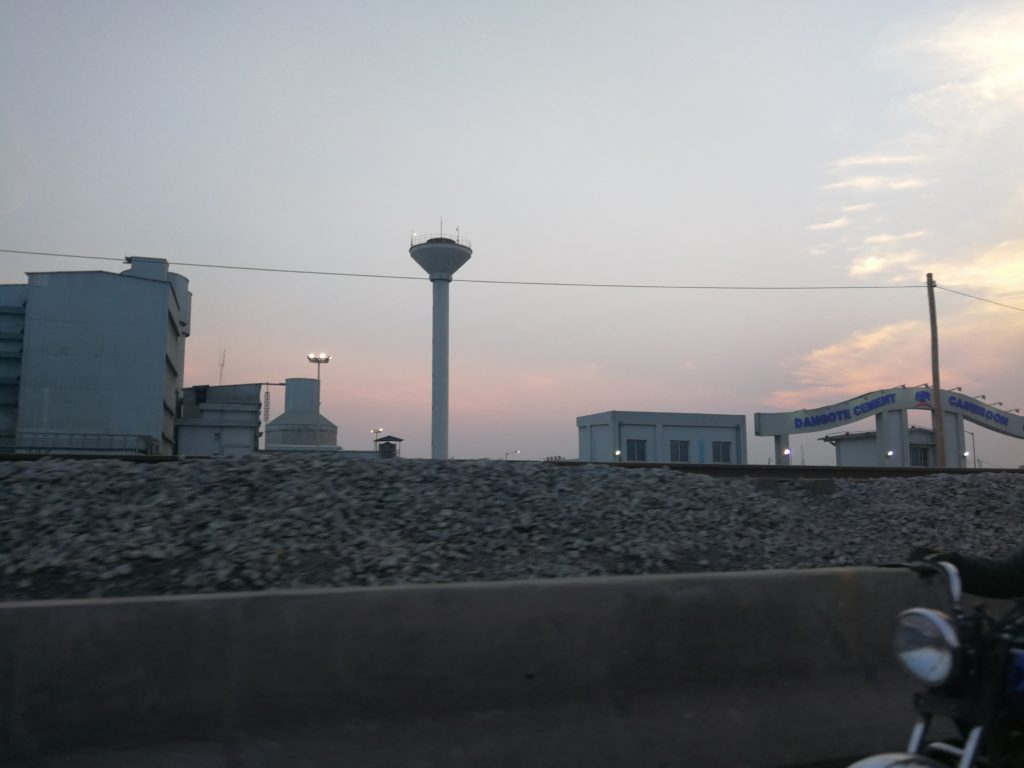
I recalled passing the Dangote Cement Plant in Douala and several other places. We arrived a bit late, around 9pm or so. I checked into the first hotel I saw that evening as I was riddled with serious fatigue. Went out to pick a few things to eat and drink before I eventually struggled to see some local television station. Now very satisfied with what I saw, it was time to notify my family and friends I was safe where I am and then take some rest in preparation for the onward trip to Buea the next day. I felt strongly fulfilled to have traveled all the way and I was somehow happy my journey was going on as planned. That was all I could remember till the next morning!

Please, what are the nativity of those soldiers on the Nigerian waterways that you did not want to talk about?
They’re Northerners.
😳 what insight! The Oronas and Ubenekang…wow!